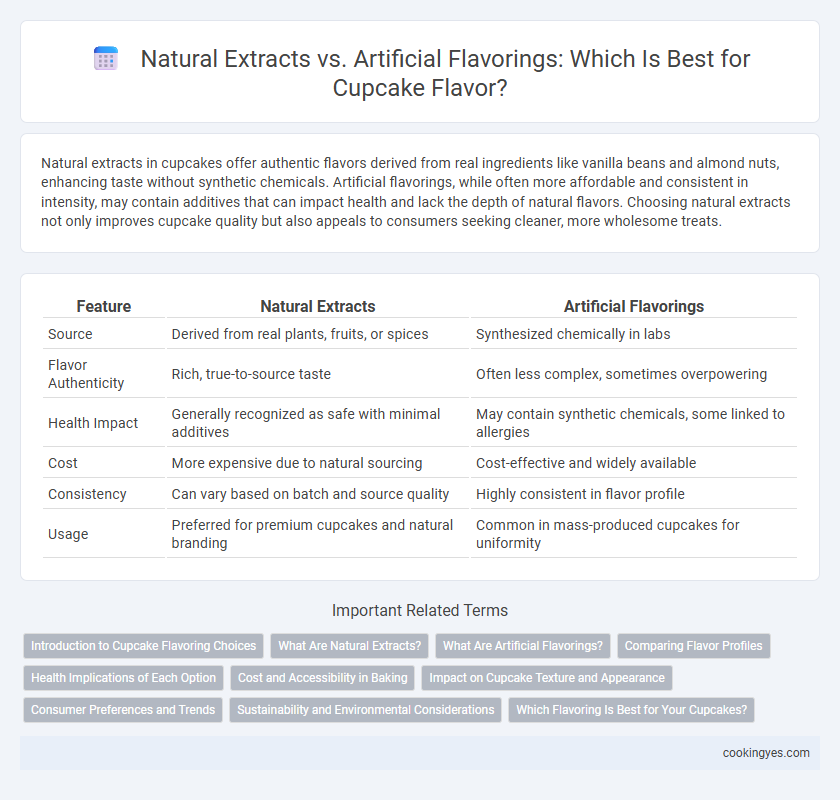Natural extracts in cupcakes offer authentic flavors derived from real ingredients like vanilla beans and almond nuts, enhancing taste without synthetic chemicals. Artificial flavorings, while often more affordable and consistent in intensity, may contain additives that can impact health and lack the depth of natural flavors. Choosing natural extracts not only improves cupcake quality but also appeals to consumers seeking cleaner, more wholesome treats.
Table of Comparison
| Feature | Natural Extracts | Artificial Flavorings |
|---|---|---|
| Source | Derived from real plants, fruits, or spices | Synthesized chemically in labs |
| Flavor Authenticity | Rich, true-to-source taste | Often less complex, sometimes overpowering |
| Health Impact | Generally recognized as safe with minimal additives | May contain synthetic chemicals, some linked to allergies |
| Cost | More expensive due to natural sourcing | Cost-effective and widely available |
| Consistency | Can vary based on batch and source quality | Highly consistent in flavor profile |
| Usage | Preferred for premium cupcakes and natural branding | Common in mass-produced cupcakes for uniformity |
Introduction to Cupcake Flavoring Choices
Natural extracts for cupcake flavoring provide authentic taste profiles derived from real ingredients such as vanilla beans, almond nuts, or citrus peels, enhancing the overall sensory experience. Artificial flavorings, composed of synthesized chemicals, offer cost-effective and consistent flavors but may lack the depth and complexity found in natural alternatives. Choosing between natural extracts and artificial flavorings impacts not only flavor authenticity but also consumer perception, health considerations, and ingredient labeling.
What Are Natural Extracts?
Natural extracts are concentrated essences derived from real ingredients such as fruits, herbs, spices, or flowers, obtained through processes like distillation or solvent extraction. These extracts contain authentic flavor compounds, providing cupcakes with genuine taste profiles and aroma compared to synthetic substitutes. Popular natural extracts for cupcakes include vanilla, almond, and lemon, valued for their clean and rich flavor impact.
What Are Artificial Flavorings?
Artificial flavorings are synthetic compounds chemically created to mimic natural flavors, commonly used in cupcakes to achieve consistent taste and lower production costs. These flavorings often contain esters, aldehydes, and ketones that replicate specific fruit, vanilla, or spice profiles without relying on plant-based extracts. Although they enhance flavor uniformity, artificial flavorings may lack the complexity and subtlety found in natural extracts, affecting the overall sensory experience of cupcakes.
Comparing Flavor Profiles
Natural extracts in cupcakes offer complex, nuanced flavors derived from real ingredients like vanilla beans or fresh fruit, enhancing the authentic taste experience. Artificial flavorings provide consistent, concentrated flavor profiles that can be more intense but often lack the subtlety and depth found in natural extracts. Consumers seeking pure, rich flavor tend to prefer natural extracts, while those prioritizing affordability and shelf stability might opt for artificial alternatives.
Health Implications of Each Option
Natural extracts in cupcakes provide antioxidants and fewer synthetic chemicals, reducing risks of allergic reactions and long-term health issues. Artificial flavorings often contain chemical compounds linked to hyperactivity in children and potential carcinogens, making them less favorable for health-conscious consumers. Choosing natural extracts supports a cleaner ingredient profile and better overall health outcomes in baked goods.
Cost and Accessibility in Baking
Natural extracts, derived from real ingredients like vanilla beans or cocoa, often come with higher costs due to extraction processes and seasonal availability, impacting budget-conscious bakers. Artificial flavorings offer a more affordable and consistent alternative, with easier accessibility in various stores and longer shelf life, making them highly practical for large-scale or frequent cupcake baking. Cost efficiency and reliability of artificial options provide significant advantages, while natural extracts appeal to premium or specialty markets despite their price and limited availability.
Impact on Cupcake Texture and Appearance
Natural extracts, such as vanilla bean or almond extract, contribute moisture and a subtle, authentic aroma that can enhance cupcake texture by promoting tenderness and a finer crumb structure. Artificial flavorings often contain alcohol or synthetic compounds that may slightly dry the batter, potentially resulting in a drier cupcake with a less uniform crumb. In terms of appearance, natural extracts usually blend seamlessly without altering color, while some artificial flavorings may impart a faint tint or oily sheen, affecting the visual appeal of the cupcake.
Consumer Preferences and Trends
Consumer preferences for cupcake flavors increasingly favor natural extracts such as vanilla bean and almond over artificial flavorings due to growing awareness of health benefits and clean-label trends. Market data reveals that cupcakes made with natural extracts experience higher sales and customer satisfaction, aligning with the demand for organic and non-GMO ingredients. Flavor innovation in cupcakes now emphasizes authentic, plant-based extracts to meet evolving consumer expectations for transparency and quality.
Sustainability and Environmental Considerations
Natural extracts derived from plants offer a more sustainable option for cupcake flavoring due to their biodegradability and lower carbon footprint compared to synthetic chemical processes used in artificial flavorings. Cultivating natural sources like vanilla beans and citrus peel supports biodiversity and reduces reliance on petroleum-based ingredients, which are common in artificial flavor formulations. Choosing natural extracts aligns with environmentally responsible baking by minimizing chemical waste and conserving finite resources.
Which Flavoring Is Best for Your Cupcakes?
Natural extracts, derived from real ingredients like vanilla beans or citrus peels, provide authentic and complex flavors that enhance cupcake quality and appeal. Artificial flavorings, while often more cost-effective and consistent in taste, may lack the depth and richness found in natural extracts, which can influence consumer preference and perceived product value. Choosing the best flavoring depends on balancing budget, desired flavor intensity, and consumer demand for natural or synthetic ingredients in cupcakes.
Natural Extracts vs Artificial Flavorings for Cupcake Flavor Infographic

 cookingyes.com
cookingyes.com